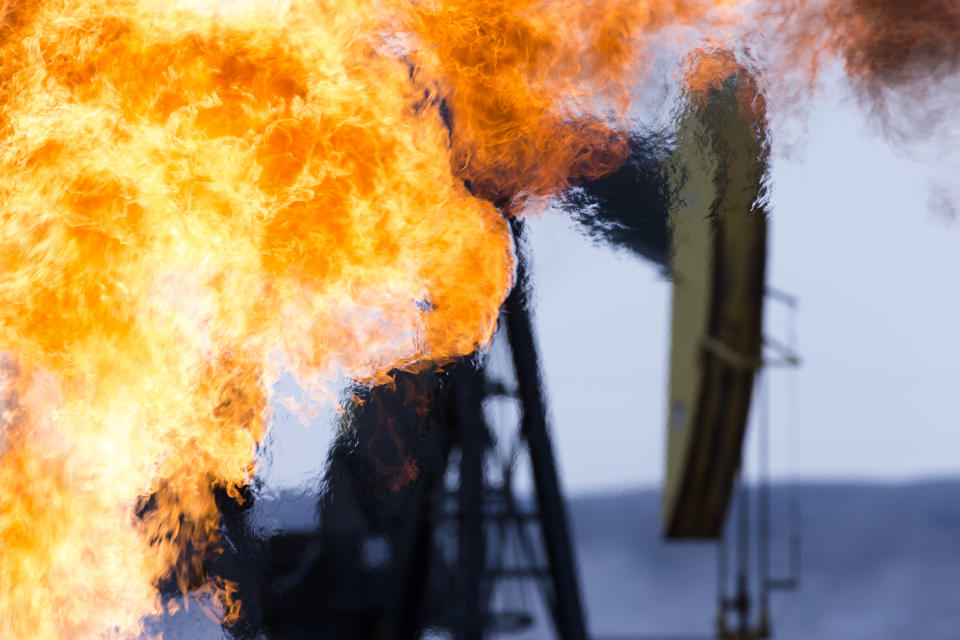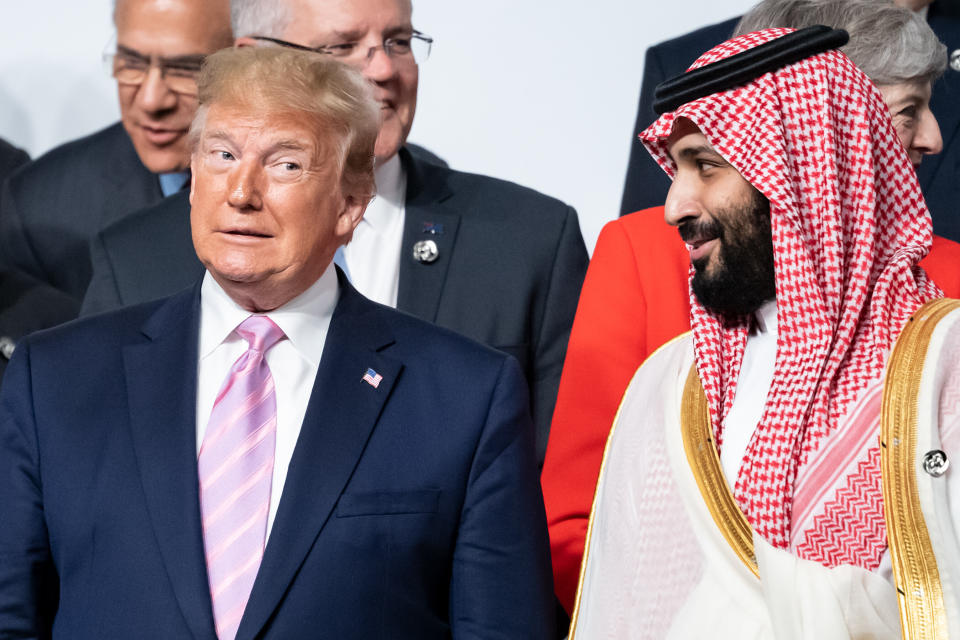Trump-Tied Law Firm Has Lobbied For Saudi Arabia — The Country Crushing U.S. Frackers
A law firm that previously employed President Donald Trump’s interior secretary has, for several years, represented Saudi Arabia, the petroleum-rich nation that recently launched an oil price war that could bankrupt U.S. fossil fuel producers.
The government of Saudi Arabia has paid lobbying giant Brownstein Hyatt Farber Schreck more than $4 million since 2016 to represent its interests in Washington, D.C. Last year, the Colorado-based firm received $1.5 million from the Saudi government for “professional services,” according to its January regulatory filing to the Department of Justice.
The revelation comes as Trump has personally waded into the oil dispute, tweeting Thursday that he has asked de facto Saudi ruler Crown Prince Mohammed bin Salman to work with Russia, another top energy producer, to curb oil production so prices can rise again.
Interior Secretary David Bernhardt was an attorney and shareholder at BHFS before joining the Trump administration in August 2017, lobbying on behalf of oil, gas and mining interests that are now benefiting from the administration’s aggressive environmental rollbacks. The lobbying giant’s domestic clients include oil and gas interests that have been hit hard by the oil market crash.
BHFS hasn’t been shy about its access to Trump’s team. In a memo to clients the day after Trump was elected, the firm wrote that it “has significant relationships across both chambers and party leadership, as well as those who will steer the incoming Trump administration.”
The firm also boasted that Politico named Marc Lampkin, managing partner of BHFS’s Washington, D.C. office, “a ‘need to know’ K Street Power Player inside the Trump transition” and that “other members of our team have also been active advisors to the Trump transition team.”
Lampkin is one of several BHFS employees who have lobbied on the Saudi government’s behalf, according to DOJ filings.

It is unclear if BHFS continues to have a relationship with the Saudi government in 2020 since its next filing under the Foreign Agents Registration Act is not due until the middle of this year. It’s also unclear if the firm’s work for the kingdom includes lobbying on oil and gas issues specifically, or if BHFS is reconsidering the business ties in light of the ongoing industry crisis.
Neither BHFS nor the Saudi Embassy in Washington responded to HuffPost’s requests for comment this week.
Riyadh’s decision early last month to flood the market with cheap oil to secure more clients and expand its share of the market sent prices tumbling to a nearly 20-year low and frustrated the U.S. fracking industry, which faces a higher cost of production than its Saudi counterpart. Adding to U.S. frackers’ woes is a decline in global demand due to the coronavirus pandemic
“It’s a financial bloodbath,” Clark Williams-Derry, an analyst at the Institute for Energy Economics and Financial Analysis, recently told HuffPost. “With oil prices at the current level, there’s a real risk many of them will simply go bankrupt.”
On Wednesday, Denver-based Whiting Petroleum Corp. became the first major U.S. shale driller to file for bankruptcy amid the price battle and deadly pandemic, The Wall Street Journal reported.
A group of 13 Republican senators sent a letter to the Saudi crown prince, known colloquially as MBS, on March 16, urging him to stabilize the oil market. And in an interview this week with CNBC, Sen. Ted Cruz (R-Texas) accused the Saudis of “engaging in economic warfare against the United States, trying to drive down the price of oil in order to exploit this coronavirus crisis to drive a bunch of American producers out of business.”

Double Dipping
BHFS represents a number of oil and gas interests that have been affected by the Saudi-led oil market crash. Its most recent lobbying disclosure data for domestic clients listed, among others, the American Petroleum Institute, the leading trade association of the U.S. oil and gas industry; Texas oil exploration and production company Hunt Consolidated; and Oklahoma-based natural gas company WPX Energy.
Meanwhile, the firm has had a relationship with the Saudi regime since 2016, when Riyadh ramped up its U.S. influence operation to combat a bill that allowed victims of the 9/11 terrorist attacks to sue Saudi Arabia over its alleged role.
BHFS continued the relationship despite growing international criticism of the Saudi regime, including after Saudi officials murdered Washington Post journalist Jamal Khashoggi in 2018, prompting some lobbyists to pull back from Riyadh.
“We don’t believe it is in our client’s interest, in our interest or in the United States’ interest to abandon them during this crisis,” Al Mottur, a BHFS shareholder and lobbyist, told the Colorado Sun in the wake of Khashoggi’s killing.
The Saudi government paid BHFS nearly $500,000 in 2017 and $1.8 million in 2018, the year of Khashoggi’s murder, according to data from the nonprofit Center for Responsive Politics.
The Saudis’ new policy to flood the oil marketplace led BHFS client API, which represents some 600 members in the oil and gas sector, to ask Trump for regulatory relief for drilling companies in a March 20 letter. And a growing number of lawmakers, many of whom have received money from the fossil fuel industry over their political careers, are calling on the Trump administration to reduce or eliminate royalties for offshore drilling operations.
API, WPX Energy and other domestic clients of BHFS did not respond to HuffPost’s requests for comment. The New Mexico Oil & Gas Association, listed in filings as another top client, said it “no longer employs” BHFS and has shifted its federal lobbying strategy, but noted that the price war has created a “challenging price and demand environment” for its members.
As the COVID-19 pandemic sweeps the nation and ravages the U.S. economy, the Trump administration continues its push to lift the U.S. fossil fuel industry and boost production. The president vowed last month to throw the oil industry a lifeline by purchasing tens of millions of barrels of crude from U.S. producers, enough to fill the nation’s emergency reserve, but the administration backed away from its plan after that funding was excluded from the $2 trillion coronavirus stimulus package.
Trump has since cheered for an industry comeback on Twitter, and during a coronavirus briefing at the White House on Tuesday said he had “great” conversations with Russian President Vladimir Putin and MBS about the oil price situation.
“We’re going to see what we can do because you don’t want to lose an industry,” Trump said, adding that “the two countries are discussing it and I am joining at the appropriate time if need be.”

Trump Turns To His Friends
Trump is slated to host executives of major oil and gas giants, including Exxon Mobil Corp. and Chevron Corporation, at the White House on Friday to discuss ways to protect their industry. Attendees likely hope the president can use his close ties with Saudi leadership to win concessions.
Karen Young, an analyst of Middle East economics at the American Enterprise Institute think tank, told HuffPost in an email that U.S.-Saudi relations in the current oil glut “are clearly tense,” but that Riyadh has little incentive to take American concerns into account in designing its approach to oil.
“I don’t see a lot of reason for Saudi Arabia to cooperate with the U.S. or individual U.S. firms,” Young wrote. “We are competitors as oil producers. That is a new development in US-Saudi ties since the shale revolution. It upends much of how we have understood our benefits to each other in the past.”
Until this week, the Saudi government showed little sign of slowing down. “As the world demands economic stability, we rise to supply energy,” reads text on a video that Aramco, the state-run fossil fuel company, posted to social media on Wednesday.
Some analysts believe Saudi Arabia will clearly benefit from inking contracts today that will more than make up for the drop in revenue it’s experiencing because of lower oil prices.
But facing pressure from Trump, Riyadh announced Thursday that it was seeking an urgent meeting of the world’s top petroleum-producing countries, which, before the current fight, had sustained a bargain that limited oil production and kept prices higher.
Love HuffPost? Become a founding member of HuffPost Plus today.
This article originally appeared on HuffPost.

